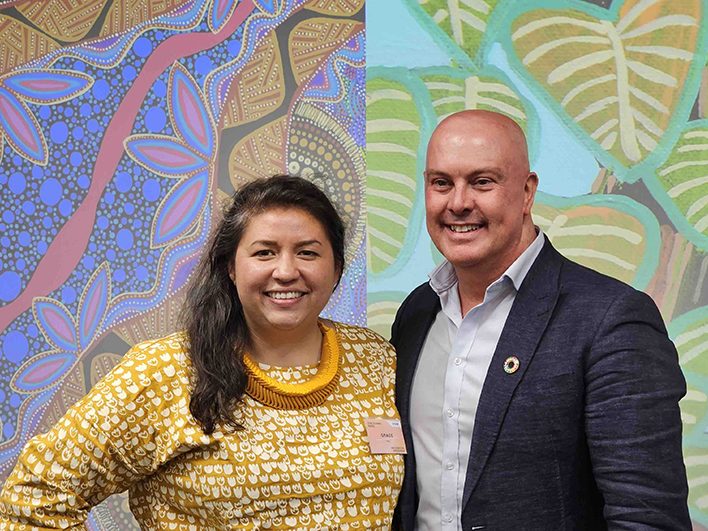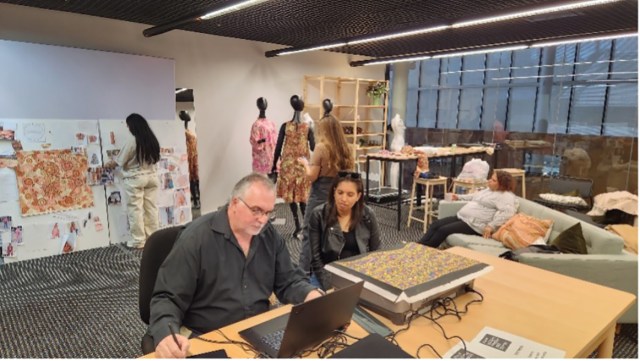
Above: Grace Lillian Lee, FNFD, and Craig Heckenberg, Epson Australia
Epson Australia is continuing its commitment to sustainable fashion, confirming it plans to extend its partnership with First Nations Fashion + Design (FNFD) following the success of the inaugural FNFD x THE ICONIC incubator training program.
Epson Australia first partnered with FNFD in May 2023 to help promote the growth of the Indigenous fashion sector through technology and sustainability.
A big part of the discussion around the initial partnership between Epson and FNFD came following the launch of Epson’s Monna Lisa ML-8000 direct-to-fabric printer, a product FNFD had been seeking for some time.
As part of the training program, designers have participated in workshops, events and experiences developed by a range of industry experts and educators such as Epson, The Hanes Group, and Bonds with ongoing feedback from the Indigenous creative community.
Epson’s applications and training specialist Derek Mobbs worked with the incubator program participants to help digitise and print their designs.
Craig Heckenberg, MD, Epson Australia, said it has been exciting to see the work of these First Nations designers become reality.
“We at Epson are delighted to be able to help tell their unique stories by using Epson digital printing technologies,” said Heckenberg.

Above: Epson’s applications and training specialist Derek Mobbs working with the Incubator program participants to help digitise and print their designs
FNFD founder and chairperson, Grace Lillian Lee, said Epson’s help, support, and printing expertise has been invaluable.
“We were so lucky to have Epson’s Derek Mobbs come out and scan the artists’ paintings and digitise the files. This was done on the Epson Expression 11000XL A3 scanner, a high-resolution A3 scanner designed to meet the most demanding graphic arts applications, that Derek bought to our hub at the Powerhouse Museum. Derek then spent time knitting the images together to make a repeat print that could be printed at length on the amazing Epson ML-8000 textile printer,” said Lee.
“There was a lot of care taken by the team at Epson to respectfully adjust the prints in order for them to become textile designs, with Derek consulting with each designer to make sure that he wasn’t changing the story of their artworks.
“First Nations artists and designers use their works as a form of storytelling and the integrity of these stories were very important to Derek and his process,” said Lee.
“There has been so much respect and care taken by the Epson team to make sure that the fabric is the correct format, sizing and configuration. The gifted fabric allowed the designers to play with scale and placement of their prints without price being a barrier. It also enabled them access to a large quantity of great quality fabrics for the sampling of their ranges so that they could meet quicker than usual deadlines for production and photoshoots.”
Epson collaborates to promote sustainability, circular economy
Priscilla Dickason, senior marketing manager ANZ, Epson, said the partnership Epson has with the Australian Fashion Council (AFC) is intended to help the AFC deliver on its goals to rebuild onshore manufacturing capability, develop future skills, and career pathways to boost economic security for the industry and transition the industry to a sustainable, circular economy by 2030.
The Epson Group is also in a partnership that promotes sustainability in the fashion industry with renowned Japanese fashion designer Yuima Nakazato.
The collection was created, in most part, using a combination of Epson’s more sustainable digital textile printing technology and a new fabric production process that Epson said at the time has the potential to “transform the fashion industry”.
Epson’s dry fibre technology, which is already used commercially to recycle paper and requires no water to produce, was adapted to produce new non-woven re-fibreised fabric from used and discarded garments.
This experimental fabric production process was first revealed in January this year as part of a three-year collaboration between Epson and Yuima Nakazato. For the show in July, Epson made further significant advances to the quality of the fabric, making it thinner, more flexible and much easier to print on using Epson’s sustainable Monna Lisa direct-to-fabric digital textile printing technology.
As part of its wider environmental vision to contribute to a circular economy, Epson has also publicly committed to becoming carbon negative and underground resource free in its Environmental Vision 2050. The use of renewable electricity is a key means by which Epson seeks to reach its goal of achieving decarbonisation.
“A significant milestone was reached in December 2023, as all Epson sites globally, including offices in Australia and New Zealand, transitioned to 100 per cent renewable electricity, totalling approximately 876 GWh annually,” said Dickason.
“Our commitment remains as we continue to measure and manage carbon emissions within our operations, and we extend support to our customers in their environmental mitigation efforts.”
Selected pieces and designs will be stocked on THE ICONIC website from 31 January and will be showcased at the upcoming FNFD X THE ICONIC event at the China Heights Gallery in Surry Hills on the same date.
Comment below to have your say on this story.
If you have a news story or tip-off, get in touch at editorial@sprinter.com.au.
Sign up to the Sprinter newsletter
